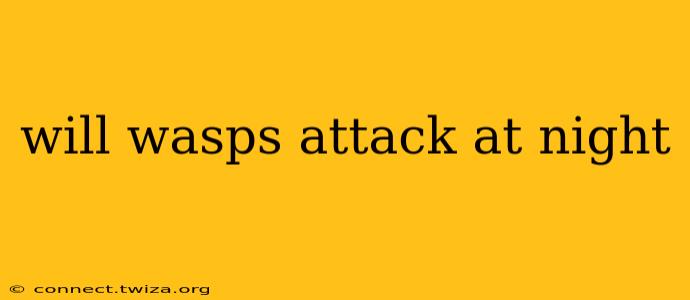Will Wasps Attack at Night? Understanding Nocturnal Wasp Behavior
The simple answer is: yes, some wasps can and will attack at night, although it's less common than daytime attacks. However, the likelihood of a nighttime wasp attack depends on several factors, including the species of wasp, the ambient light, and the wasp's individual temperament. Let's delve deeper into this fascinating, and sometimes frightening, aspect of wasp behavior.
What Types of Wasps Are Most Active at Night?
Most wasp species are diurnal, meaning they are most active during the day. However, some species, particularly those that are nocturnal hunters or scavengers, are more likely to be encountered at night. These often include certain species of parasitic wasps and some solitary hunting wasps. Their nighttime activity is usually linked to their hunting strategies or the behavior of their prey. Identifying the specific species involved is crucial in understanding their nighttime behavior.
Do Wasps See in the Dark?
Wasps, like many insects, have different visual capabilities than humans. While their vision isn't as sharp at night as during the day, many species possess adaptations that allow them to navigate and hunt in low-light conditions. They rely more on other senses, such as smell and touch, to locate food and potential threats.
Why Might a Wasp Attack at Night?
A nighttime wasp attack is usually a defensive reaction. Wasps are less likely to be aggressively seeking out humans at night, but they will certainly defend their nests if disturbed. This could happen if you accidentally stumble upon a nest while walking in the dark, or if you disturb them near a light source attracting insects.
Are Nighttime Wasp Attacks More Dangerous?
While not inherently more dangerous than daytime attacks, nighttime attacks can be more surprising and potentially more frightening because of the reduced visibility. This can lead to more panicked reactions from humans, increasing the likelihood of stings.
What Should I Do If I Encounter a Wasp at Night?
Remain calm and avoid sudden movements. Slowly and carefully back away from the area, avoiding swatting or making loud noises. If you have a light source, try to avoid shining it directly on the wasp, as this could agitate it. If you feel threatened, seek shelter immediately.
How Can I Prevent Nighttime Wasp Encounters?
- Keep lights off or dimmed: Outdoor lights attract insects, including wasps, which can increase the chance of encounters near your home.
- Secure your trash: Properly store your garbage to prevent attracting wasps seeking food scraps.
- Inspect your home: Check for any wasp nests near your house, particularly in dark, sheltered areas, before nightfall.
- Avoid nighttime outdoor activities in areas known for wasp activity.
Understanding the nuances of wasp behavior, particularly their nighttime activity, is crucial for preventing stings and staying safe. Remember, the vast majority of wasp encounters are avoidable with a little precaution and awareness.
